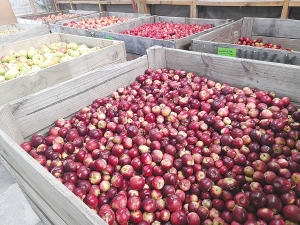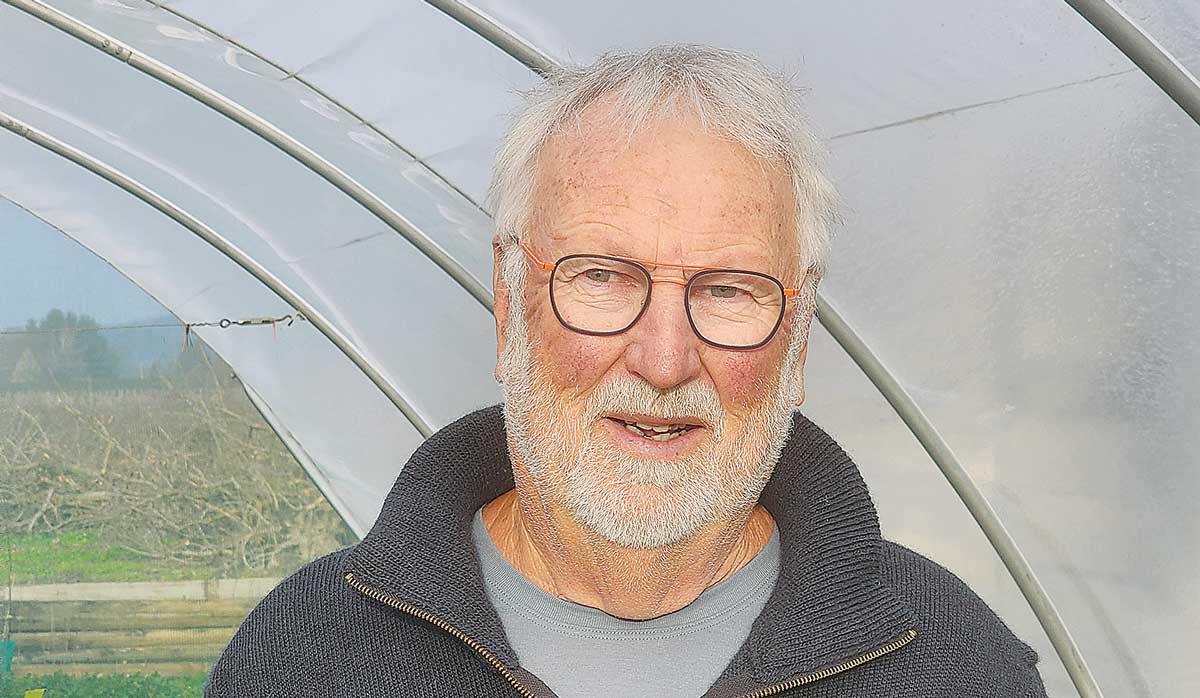MPI Hails Kiwifruit Boom as Horticulture Revenue Surges Past $9 Billion
Ministry for Primary Industries (MPI) Director General Ray Smith is giving a big shout-out to the horticulture sector, especially kiwifruit.
 Apple breeder Allan White says about 2232ha of cider apple orchards would be needed, producing 125 million litres of cider annually.
Apple breeder Allan White says about 2232ha of cider apple orchards would be needed, producing 125 million litres of cider annually.
Cider Apples New Zealand Limited has released a detailed 'roadmap' report that investigates how a premium cider industry could be developed in New Zealand.
The roadmap charts a course towards achieving a billion-dollar export sector within 15 years. Supported by rigorous economic analysis, the roadmap confirms substantial returns are possible for both cider apple growers and cider makers.
Industry experts John Powell, a seasoned cider maker, and Allan White, a leading apple breeder, collaborated on the report. Together, they co-founded Cider Apples NZ to spearhead initiatives aimed at realising this ambitious vision.
Their efforts were bolsteredby funding from MPI and AGMARDT, enabling research into establishing a flourishing premium cider industry in New Zealand.
This initiative is said to represent a significant milestone in New Zealand's agricultural diversification strategy. It focuses on creating high-value export opportunities by leveraging the country's renowned agricultural expertise and optimising the use of non-premium agricultural land. "We envision a future where New Zealand premium cider stands at the forefront of global markets, celebrated for its quality and authenticity," says Powell.
Today, the global cider market, though currently the smallest among fermented alcoholic beverages, shows promising growth trends. According to the Weston's 2024 Cider Report, global consumption exceeds 2.6 billion litres, with a notable shift towards premiumisation echoing trends seen in wine and craft beer.
Powell says the success of New Zealand's Sauvignon Blanc and aromatic hops has inspired industry leaders to turn their focus to cider, poised to capitalise on consumer demand for unique flavours and authentic provenance.
"Globally, premium cider categories are gaining traction as a lower-alcohol alternative to wine, a gluten-free option compared to beer, and due to their high levels of antioxidants and polyphenols. The strongest growth is observed among affluent millennials and Gen-Z consumers seeking sophisticated beverage choices. Our cider apple breeding programme is achieving remarkable flavours and aromatics that will resonate with global cider enthusiasts," says Powell.
To achieve the projected $1 billion export milestone, White says approximately 2232 hectares of cider apple orchards would be needed, producing 125 million litres of cider annually, assuming an average export price of $8 per litre.
"The roadmap confirms substantial potential for New Zealand's premium cider industry. We are actively seeking expressions of interest from apple growing businesses and beverage producers to work together with Cider Apples New Zealand on a new funding application to progress the roadmap and accelerate sector growth," says Powell.
The proposed 7-year programme aims to refine six key workstreams, including accelerated cider apple breeding, orchard design, consumer research, industry capability development, regulatory frameworks, and market pathways.
 |
|---|
|
Allan White |
"Developing successful unique cider apple varieties demands a consumer-driven approach. This initiative calls for collaboration between cider makers and apple growers to propel our roadmap forward," says Powell.
Report Highlights
Key highlights of the report include:
Profitability Potential: Exploration of the economic benefits across the cider value chain.
Market Research: Identification of key export markets and trends, aligning with the global trend towards 'premiumization' in beverages.
Cultivar Development: Opportunities for advancing and commercialising new cider apple varieties tailored for the sector's development.
Stakeholder Engagement: Discussions with cideries, landowners, and Māori/iwi groups to align production with consumer preferences and market demands.
At its core, the project seeks to develop unique New Zealand ciders that captivate global consumers, much like New Zealand’s Sauvignon Blanc and aromatic hops have done with their distinct flavours and quality. Central to this vision is the cultivation of new cider apple cultivars boasting distinctive levels of tannins, polyphenols, and sugars, coupled with enhanced pest and disease resistance and tolerance to climate change. The initiative does not target the current practice of using processing grade fresh apples or traditional cider apple varieties that are often less productive and susceptible to pests and diseases.
“Cider, a beverage with a rich history dating back over 4000 years, is experiencing a global resurgence. Our ambition is to pioneer a new era of premium cider production in New Zealand, driven by innovation and consumer demand,” says Allan White.
The report was launched in Auckland two weeks ago. The comprehensive findings show potential to redefine the landscape of New Zealand’s beverage industry, identifying key strategies and work streams essential for coordinating this emerging sector’s growth trajectory.
Changed logos on shirts otherwise it will be business as usual when Fonterra’s consumer and related businesses are expected to change hands next month.
Reflecting on the past year, Horticulture New Zealand chief executive Kate Scott says there has been a lot to celebrate.
Ministry for Primary Industries (MPI) Director General Ray Smith is giving a big shout-out to the horticulture sector, especially kiwifruit.
Early forecasts for New Zealand's apples and pears point to a standout season marked by exceptional fruit quality and high pack-out rates.
Tickets are now available for Beef + Lamb New Zealand’s (B+LNZ) Out the Gate, returning from 19-21 May 2026 at Te Pae, Christchurch.
Dairy Women's Network (DWN) is welcoming AgriHealth as a new partner.

OPINION: Here w go: the election date is set for November 7 and the politicians are out of the gate…
OPINION: ECan data was released a few days ago showing Canterbury farmers have made “giant strides on environmental performance”.